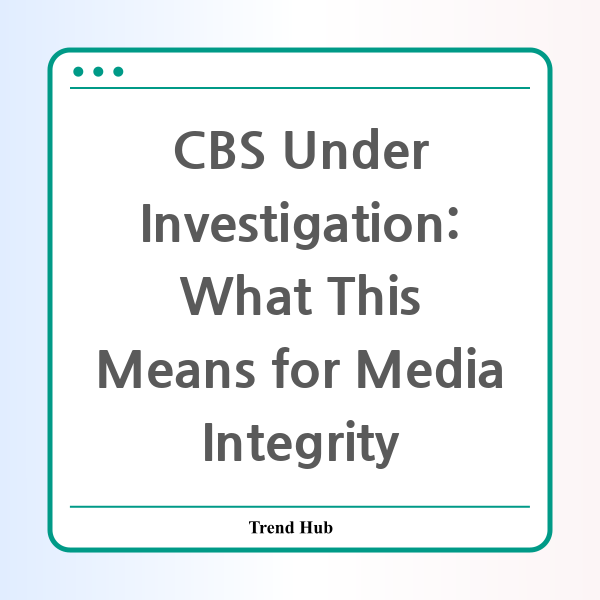* This website participates in the Amazon Affiliate Program and earns from qualifying purchases.

In a rapidly evolving media landscape, the spotlight is on CBS as it faces scrutiny from the Federal Communications Commission (FCC). Recent news surrounding complaints against the iconic program "60 Minutes" has stirred up discussions about news integrity, accountability, and the implications of federal inquiries in the broadcasting industry.
At a recent conference, Brendan Carr, the FCC chair, clarified his perspective on the ongoing investigation into CBS. He emphasized that the inquiry should not be perceived as a threat but rather as a necessary component of the Communications Act aimed at ensuring ethical broadcasting practices. This investigation arises amidst allegations of news distortion, raising questions about the integrity of a program that has long been regarded as a pillar of American journalism.
During his conversation, Carr pointed out that the focus of the investigation lies not on local television stations, but rather on larger media conglomerates that have significant influence over content dissemination. He suggested that local stations desire more autonomy to cover community issues without overarching control from national broadcasters. This brings forth a fundamental issue in the media industry: the balance of power between local stations and national networks.
Moreover, the FCC's inquiry is not occurring in isolation. It coincides with complaints lodged against other major networks such as NBC and Fox News, which further complicates the landscape for broadcasting giant CBS. The backdrop of this investigation includes heightened tensions and criticisms stemming from various political factions, notably criticisms from former President Trump, which have ignited debates about the role of media in shaping public perception and political narratives.
More recently, CBS found itself amidst internal turmoil following allegations of editing improprieties related to an interview with Kamala Harris. This revelation has contributed to what many are describing as the "self-implosion" of CBS, prompting calls for greater transparency and accountability in news reporting practices. The editing of interviews, a contentious practice in broadcasting, has led to accusations of misleading the public, raising ethical concerns about how news is curated and presented.
In the midst of this controversy, the FCC is simultaneously evaluating CBS's proposed merger with Skydance Media. Carr has stressed that the investigations into news practices and the merger are distinct, yet this entanglement raises further questions about corporate media governance. As the merger promises to reshape the landscape of broadcasting, it remains crucial to keep an eye on how these developments influence journalistic practices and the future of media integrity.
The implications of the FCC's inquiry extend beyond CBS; they raise critical questions about the fundamental purpose of journalism in a democratic society. With increasing pressures from various fronts, including political criticism and corporate interests, the responsibility of media organizations to uphold ethical standards has never been more urgent. How CBS navigates this storm may well set a precedent for how media integrity is maintained in the face of scrutiny and corporate mergers moving forward.
As consumers of news, it's our duty to remain vigilant, question the narratives presented to us, and advocate for accountability in media practices. The ongoing developments at CBS serve as a reminder of the vital role that media plays in shaping public discourse and the importance of fostering an environment where factual reporting is prioritized over sensationalism.
* This website participates in the Amazon Affiliate Program and earns from qualifying purchases.